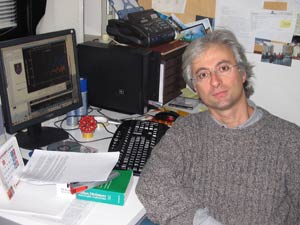

| Athens/Institutional login |
| Switch to live IOP username: czh Logout | Alerts | Contact us |
 |
||||

|
|
|||
| Journals Home | Journals List | EJs Extra | This Journal | Search | Authors | Referees | Librarians | User Options | Help | | ||||
View Journal of Physics: Condensed Matter authors or all authors grouped by journal in the 60 seconds with ... Authors Edition. The original edition of 60 seconds with ... is also available.

Professor Andrea Di Cicco
Q: What led you into science and your chosen area of research?
A: I was interested in basic science and physics since I was a boy, playing with electronics at the beginning and being more involved in basic physics later at the high school in Rome, thanks also to a good professor in physics. I think that the common belief about culture as a fundamental value, shared by a generation in the sixties and seventies and transmitted sometimes to young people, played an important role. Science and physics in particular were considered by me at the forefront of culture development. I took the final decision to study physics while writing a short dissertation for the high school diploma (maturita) about the cultural revolution taking place in science (and not only in science) in the first 30 years of the last century. I remember of that time my fruitless efforts in reading the initial chapters of "Quantum Mechanics" pushing me to deepen my knowledge in physics at the University of Rome. The possibility of studying and working in the stimulating environment of Frascati laboratories in the mid eighties led me to the chosen area of research.
Q: Can you describe the results in your paper, 2005 J. Phys.: Condens. Matter 17 S135-S144, and their importance for your field?
A: Those results come from a longstanding project aimed to improve our knowledge about the local structure of disordered systems using the x-ray absorption spectroscopy in a more reliable and efficient way. The final goal of the project is a consistent tridimensional reconstruction of the average structure combining various techniques and the above mentioned work reports about the first successful results in a simple gaseous system and in liquid copper.
Q: What research projects are you working on at the moment?
A: I am deeply involved in measuring and understanding the local structure of matter under extreme conditions using some of the most advanced experimental and data-analysis procedures. This research is intended to be useful both for basic science, for example discovering phase transition and structure of liquids under high pressure conditions, and for applications (new materials obtained using unconventional routes, nanoparticles used for technology and energy purposes ...).
Q: What do you think will be the next big breakthrough in your field?
A: This is a very difficult question. There are many scientists working on very important problems in my field, but I think that a real breakthrough is more likely to come from basic, non-oriented research so in quite unpredictable directions.
Q: What book are you reading right now?
A: In the last years I am used, unfortunately, to read more non-scientific books at the same time and keep reading them for quite a long time. The latest books to mention are: 1) Vita di Pasolini (E. Siciliano); (2) The Plot Against America (P. Roth); 3) Zazie Dans le Metro (R. Queneau).
Q: If you could have dinner with any 3 people, past or present, who would they be and why?
A: This is again a difficult question, because I like to have dinner with friends, not well-known to the public. Having decided to have an ''important'' and pleasant dinner, a good choice would be Pier Paolo Pasolini, Vanessa Redgrave, and Albert Einstein.
Q: What has been the most exciting moment in your career so far?
A: I still feel like a child when I make a discovery, even a very little one, so the most exciting moments are still those during experiments and new understanding coming from them. The most exciting coming to my mind is obviously one of the last ones, so when we successfully measured a quite reactive liquid under extreme and deeply metastable conditions. I admit also to be excited also when a paper is accepted in an important journal or when my work is recognized in various ways, but this is a second-order excitement.
|
Journals Home | Journals List | EJs Extra | This Journal | Search | Authors | Referees | Librarians | User Options | Help | Recommend this journal Use of this service is subject to compliance with the Terms and Conditions of use. In particular, reselling and systematic downloading of files is prohibited. Help: Cookies | Data Protection. Privacy policy Disclaimer |